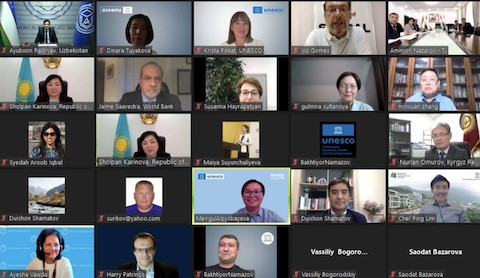
GCED Basic Search Form
Quick Search
Usted está aquí
Noticias

ALMATY, October 13, 2021 – Government officials, education professionals, representatives of academia from Central Asian states, as well as international experts on teacher policy, discussed approaches to developing, attracting, and retaining the best talent in teaching at the online Central Asian “Skilled Teachers – Skilled Nation” Symposium on Education. The event was co-organized by UNESCO Cluster Office in Almaty and the World Bank’s Education Global Practice.
The goal of the event was to launch a regional knowledge exchange program and policy dialogue on improving learning outcomes of Central Asian students through a more effective and empowered teacher force. The timing of the event was not coincidental: theCOVID-19 pandemic has undermined human capital development gains across the region, exacerbating learning poverty, and widening the gap between students of different backgrounds.
“A successful education recovery hinges on increased investment in teachers to recover learning losses and manage transformations in teaching and learning imposed by the COVID-19 pandemic,” said Krista Pikkat, Director of UNESCO Almaty Cluster Office for Kazakhstan, Kyrgyzstan, Tajikistan and Uzbekistan. “We hope today’s discussions can help enhance the country policies on teacher development, so we can improve the quality of learning.”
Teachers are the critical factors behind education quality. For instance, the difference between a weak teacher and a great teacher has been measured at 0.36 and 0.54 standard deviations (SDs) in student test scores in Uganda and Pakistan which is equivalent to more than one additional year of schooling. Studies also find that several consecutive years of effective teaching can offset the learning shortfalls of marginalized students.
“The role of teachers in improving education quality cannot be overemphasized. Teachers hold the keys to inspiring and unlocking every child’s potential. Their responsibility is immense,” said Jaime Saavedra, World Bank Global Director for Education. “But teachers need opportunities, motivation, and resources to succeed in leading generations of leaders, thinkers, and innovators.”
Recognizing the importance of teachers in improving learning outcomes, Central Asian countries are in the early stages of reforms, as they introduce more incentives to attract, develop, and retain good quality professionals into the teaching profession. In Kazakhstan, the authorities are raising requirements to enter teacher education colleges, offering more financial support to students in education, increasing salaries and the number of hours of practical training. Teacher salaries have also increased thrice over the last decade in the Kyrgyz Republic. Meanwhile, Uzbekistan passed a law in 2021 to ensure that trainings are targeted to teachers’ needs. Such developments will empower teachers to lead improvements in education quality in their classes, schools, communities, and countries.
The online symposium consisted of two main discussions focusing on national perspectives and global best practices. Representatives of education ministries of Kazakhstan, Kyrgyz Republic, Tajikistan, and Uzbekistan discussed policies and programs that can transform teaching into an attractive and progressive career.
Symposium participants agreed that effective systems need to incorporate competitive recruitment, focused in-service training, school-based teacher research groups, teacher performance evaluation, and a structured career ladder that provides both motivation and a mechanism for teachers to progress in their careers.
The symposium featured presentations by experts and researchers from the Education University of Hong Kong, Nazarbayev University, and Shanghai Normal University.
***
UNESCO has made the supply of well-trained, supported and qualified teachers one of its top priorities. UNESCO hosts the International Task Force on Teachers for Education 2030 to address the “teacher gap” as well as tackle the issues raised in SDG target 4.c – to supply qualified teachers and ensure working conditions. In Central Asia, UNESCO is supporting teachers by equipping them with relevant skills and competencies, as well as providing them with teaching resources in the area of competency-based education and distance learning. Through its Global ICT Competency Framework for Teachers tool, UNESCO is supporting Central Asian countries in assessing teachers’ ICT competencies and strengthening ICT competency standards for teachers.
The World Bank’s education portfolio is $23.4 billion, benefiting approximately 18 million teachers worldwide. The World Bank’s “Learning for the Future Project” in the Kyrgyz Republic is developing digital educational resources for teachers and training 30,000 teachers in digital literacy, 6, 000 teachers in remedial reading training and 14, 000 teachers in pedagogy. The “Education Modernization Project” in Kazakhstan is supporting reforms in pre-service and in-service teacher training. The “Early Childhood Development to Build Tajikistan’s Human Capital Project” is supporting teacher training and development. In Uzbekistan, the “Promoting Early Childhood Development Project” is also helping improve professional skills of 14,000 preschool teachers across the country.
URL:
http://en.unesco.kz/central-asian-symposium-on-education-highlights-the-crucial-role-of-teachers
